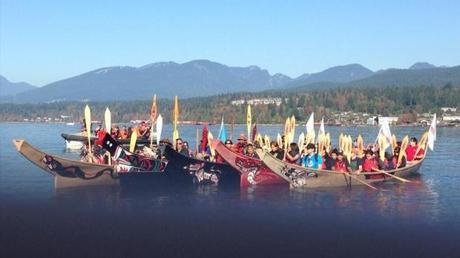
B.C. First Nation, the Tsleil-Waututh, were joined by environmentalists Monday, as they crossed Burrard Inlet in canoes to protest Kinder Morgan’s proposed pipeline expansion. (CBC)
from CBC
The Tsleil-Waututh First Nation and environmentalists have crossed Burrard Inlet in traditional canoes to protest U.S. oil giant Kinder Morgan’s $5B plans to expand its Trans Mountain pipeline.
Protesters dodged tankers as they sailed close to the Westridge Marine Terminal, in a bid to stop Kinder Morgan nearly tripling the capacity of the pipeline, which carries crude oil from the Alberta oilsands to tankers in Vancouver.
When completed, the proposed expansion is expected to increase capacity in Trans Mountain from the existing capacity of 300,000 barrels per day to 850,000 barrels per day.
The protest comes as cabinet ministers and senior bureaucrats head to British Columbia as part of a major government push to mollify opponents of building oil pipelines to the West Coast.
The new Harper initiative follows a report from the prime minister’s special pipelines representative in British Columbia, David Eyford, who told Harper last month that negotiations with First Nations are a mess.
Sources tell CBC News Eyford urged the federal government take the lead role in dealing with Indian bands on both the proposed expansion of Kinder Morgan’s Trans Mountain pipeline and Enbridge’s Northern Gateway project.
The Trans Mountain line stretches 1,150 kilometres between Edmonton and terminals in the Vancouver area and Washington State. It carries heavy and light crude oil, as well as refined products such as gasoline and diesel.
It has been involved in several recent spills including more 100,000 litres of light crude oil that was spilled at Kinder Morgan’s Sumas terminal in January.
Meanwhile, an Enbridge official says the company expects a decision from the federal government on its proposed Northern Gateway pipeline by mid-2014, meaning the pipeline could be moving oil by 2018.
The Northern Gateway pipeline proposed by Enbridge would deliver 525,000 barrels of petroleum a day to a tanker terminal in Kitimat, on the north coast of B.C.

